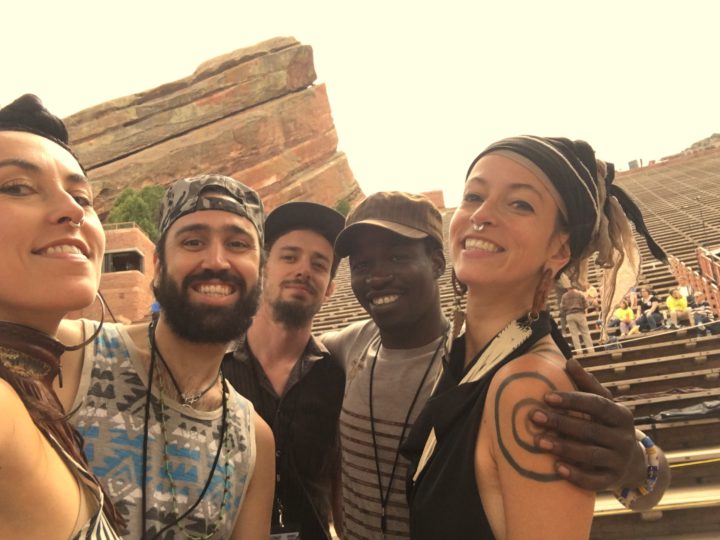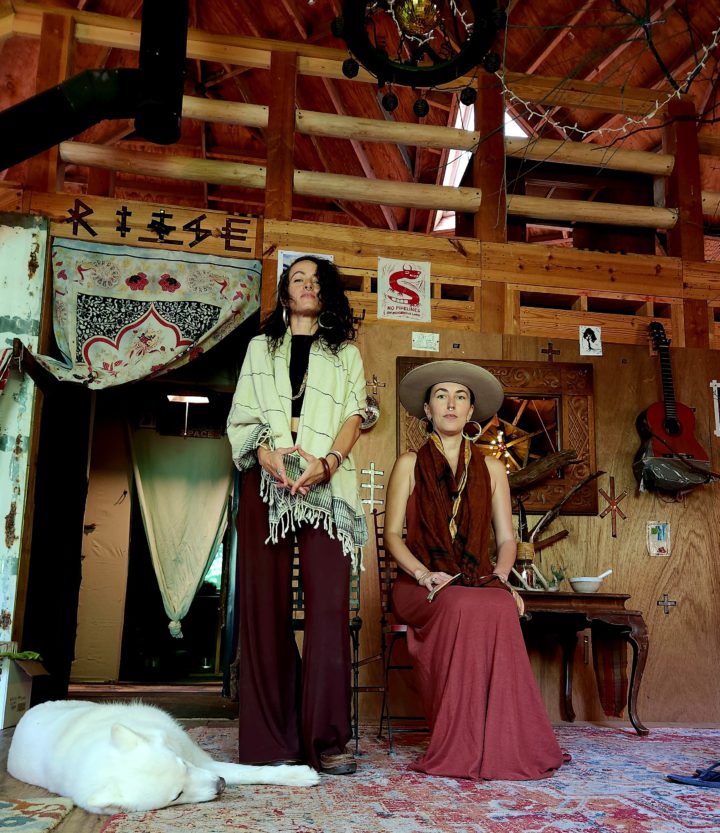The plan was for me to meet Leah Song and Chloe Smith, the founding members of the band Rising Appalachia, at their “art squat” in the mountains just outside town. It’s a place where they go to relax, dream, write songs and immerse themselves in nature. I arrived first. While waiting, I heard a series of bird calls from a cardinal, catbird, goldfinch, hooded warbler, black-and-white warbler and American redstart.
Once the sisters arrived, we entered the space. The art squat is an uninsulated, rambling structure that Song happily compares to something out of Mad Max. Despite its rustic nature, this is a special place for the musicians and those in their orbit. Their side project, Starling Arrow, an a cappella folk ensemble, filmed the video for their song “Oh Darlin’” here; and their percussionist, Biko Casini, once spent 40 days on the property in silence while fasting periodically and playing drums for as many as eight hours a day.
I had come to the art squat to talk to Song and Smith about Catalyst, the two-day festival they will be hosting Saturday, July 15, and Sunday, July 16, at Salvage Station. I was hoping to portray them as local stars who have chosen their hometown to be the site of the first major festival they’ve organized, but the sisters reminded me they were born and raised in Atlanta, have spent a big chunk of their adult lives in New Orleans and only reside in Western North Carolina a portion of the year.
“We’re not from here,” Smith said, “but it has been a cultural and creative haven for us.”
A closer look at their early lives, however, suggests that Asheville is as much of a home to these two wandering troubadours as any place else.
A seed gets planted
Song and Smith come from a family of folk musicians with a deep love for old-time Appalachian music. Their parents frequently took them to gatherings such as the Appalachian String Band Music Festival in Clifftop, W.Va., and the Swannanoa Gathering at Warren Wilson College. Smith recalls celebrating her first birthday at the Black Mountain Arts Festival (since renamed the LEAF Festival).
As teens, the girls often helped vendors sell CDs so they could get into the Swannanoa Gathering’s daytime workshops at a discounted rate. At night, they were often found spinning fire behind the fiddle jam sessions. The education they got in old-time Appalachian music combined with a newfound appreciation of the genre by their peers inspired them to start playing.
“We were seeing more young people at contra dances and young fiddlers at the Swannanoa Gathering,” Smith said. “And we were like, ‘This is something beyond what our parents have shown us.’”
After graduating from Atlanta’s Henry W. Grady High School (since renamed Midtown High School), the sisters spent a couple of years in a communal living situation in Asheville’s Montford neighborhood. As part of the “Panola Street Posse,” they reveled in their street’s country-in-the-city vibe, with its tree houses, goats and urban farms.
In 2005, they recorded their first album, Leah and Chloe, at a friend’s recording studio in Atlanta. It was an act of love, a gift to family and friends, but its impact extended well beyond their inner circle.
“That album was such an original take on old-time music,” David Brown, who plays upright bass and baritone guitar for the band, told me during a recent chat at High Five Coffee on Broadway. “Whereas a lot of the old-time music has a very high piercing vocal sound that can sound a little harsh at times, they were approaching it in this very sultry kind of way.”
After the unexpected success of Leah and Chloe, Song and Smith moved to New Orleans, where they worked as buskers on and off for six years, primarily on Chartres Street in the French Quarter.
Standing just outside the art squat, the sisters described their busking days, often completing each other’s thoughts, which I’d come to recognize as an endearing habit of theirs.
“We took it seriously,” Smith said. “It was our job. We learned so much about how to be artists.”
“About how to write songs,” added Song. “About how to entertain. Because people don’t have to listen.”
Among the highlights of that period: Lenny Kravitz once stopped to chat for a few minutes and Mos Def tipped them $5.
In 2006, the duo created and headlined Concrete Pandemonium, a raucous gathering at an art gallery in downtown Atlanta. The annual event, which lasted three years, blended art, activism and music. It also planted a seed in their heads. Maybe one day they could organize an event just like it on a grander scale. But derailed by a touring schedule that left little time for organizing festivals, it would be years before that seed blossomed into a flower.
Rising Appalachia 2.0
By 2011, Rising Appalachia entered a period of transition. Song and Smith had tried nearly every possible iteration of the band — a duet, a quartet, a five-piece as well as a six — and were now looking for more continuity.
One afternoon Song was walking through a cluster of houses in Barnardsville when she overheard Brown playing banjo in his kitchen. She peeked her head in the door. “Hey, that sounds good,” she told him.
Rising Appalachia didn’t need a banjo player — Song and Smith had that covered — but their band did have some holes they were looking to fill.
“Do you know any upright bass players around Asheville?” Song asked Brown.

Brown stifled a chuckle. After graduating from Warren Wilson College in 2005, he’d played upright bass in The Greasy Beans, a band of Warren Wilson alumni that included the fiddler Cailen Campbell. Brown had started his musical journey playing guitar, and after The Greasy Beans dissolved, Campbell persuaded him to pick it back up and play contra dances with him as the duo Contraversial.
There’s a perception in bluegrass music that the least talented band member often plays the upright bass, so Brown was happy he’d gotten to a place in his career where bass wasn’t his first instrument. But the opportunity to play in a band like Rising Appalachia was too tempting to ignore.
“Well,” Brown said to Song that day in Barnardsville, “as a matter of fact …”
Brown’s addition as a full-time member of the band, along with that of Casini the same year, launched a new era — let’s call it Rising Appalachia 2.0 — that saw the band’s popularity and fan base grow at an even more accelerated rate, with sold-out shows at The Grey Eagle and later The Orange Peel.
Despite the group’s ongoing success, both nationally and internationally, Song and Smith have continually resisted overtures from major record labels and insisted upon growing the band in a slow, organic fashion that’s rare in the music industry.
In a 2015 TEDx talk, Song discussed a principal tenet of her band’s ethos, which she called the Slow Music Movement. Bands are notorious for having extravagant, consumptive habits that hurt the environment. How could they lessen that impact while at the same time forming a stronger connection with local activists and nonprofits?
She and Smith began to schedule their tours so that they focused on particular regions instead of hopping from one big city to the next, and they traveled by van, train, sailboat, even foot, rather than by plane. As the Slow Music Movement evolved, Song and Smith kept coming back to an idea that wouldn’t go away: Instead of traveling the world sharing their music, why not stay in one place and host a gathering that would not only deliver a feast of music but also give local nonprofits and educators a place to spread their messages?
The seed for the Catalyst festival was starting to grow.
A spirit of collaboration
Then COVID hit.
As it did for so many others, the pandemic rocked the band’s world. Their touring schedule screeched to a halt. Song got stuck in Costa Rica for nearly a year. And during one 10-month stretch, the band members, which now included the West African percussionist Arouna Diarra and fiddle and cello player and West Asheville native Duncan Wickel, were never all together in one place.
But instead of bemoaning canceled shows and lost income, Song and Smith embraced the pandemic as a time to rest and recharge, and they have emerged ready to enter a new phase of their careers.
During our time together, the sisters acknowledged that their band’s style of activism was changing. Whereas Rising Appalachia 2.0 was constantly promoting permaculture action days and a “down with the system” philosophy, the latest iteration of the band is embracing what Song called a “spirit of collaboration and gentleness.”
As part of that spirit of collaboration, Song and Smith reconsidered an invitation they received several years ago from some promoters in California to organize a festival there. The sisters loved the suggestion but balked at the location. Song recalled the band’s response: “We said, ‘If we’re going to do this, it should be in the South in a place that we know well and feel connected to.’”
Asheville was an easy choice. Beyond living here part time and playing here often, they have also captured some of their best material at the Echo Mountain Recording studio, including the albums Wider Circles, The Lost Mystique of Being in the Know and parts of Filthy Dirty South, as well as the singles “Stand Like an Oak,” “Hungry World” and “Resilient.”
Choosing a venue also wasn’t difficult. During the pandemic, they fell in love with playing outdoor shows, and Salvage Station had earned a special place in their hearts. “They’re really supportive of our work and were ready to try something new with us,” said Smith.
In recent years, the band has played several shows there during the summer as well as a winter solstice celebration on a misty afternoon in December 2021 that had fans huddling around fire pits. “It was a commitment,” said Smith, laughing at the memory. “We call that ‘extreme folk.’”
To Song, dealing with the elements, good or bad, adds to the charm. “At Salvage [Station] you can see if a storm is coming or if the sun is setting. There you just feel like you’re in the place so much more.”
A curated event
Song and Smith describe Catalyst as a “curated event,” and there’s no question who is doing the curating. The two have always embraced the DIY ethic, and their fingerprints are all over the festival, from its title to the lineup and everything in between.

The two-day festival will feature workshops each day and music each evening. Rising Appalachia will headline both nights. Song described the Saturday show as a “shake it out, get your body moving … dance party.” Featured performers will include folk, hip-hop duo The Reminders, Dirtwire and Brandon Lewis, a trumpet player with New Orleans’ Preservation Hall Jazz Band.
Sunday will have more of a folk vibe, with Starling Arrow and Valerie June, the Grammy-nominated singer-songwriter from Tennessee, both playing sets.
Festivalgoers can also buy tickets that allow them to see music at night and attend workshops featuring yoga, meditation, dance and herbalism during the day. “We love being around musicians,” said Smith, “but we love being around other types of people as well.”
Catalyst, Smith added, will be her first show with the full band since last fall. Wickel’s wife, Lily Henley, has been filling in for Smith while she’s been on maternity leave. Organizing a festival while looking after a baby has been a juggling act at times, but any tension she and Song might be feeling in the days leading up to the festival is alleviated by the knowledge that they have handpicked all the performers. Collaborating on the event with local organizations such as Firefly Gathering and Wild Abundance also has them at ease.
The plan, the sisters told me during our time at the art squat, is for this year’s Catalyst to be the first of many in Asheville and surrounding areas.
“We want to be catalysts in our communities,” said Song.
“Creative pot stirrers,” added Smith, completing her sister’s thought.
For more information, visit avl.mx/ct2.



Before you comment
The comments section is here to provide a platform for civil dialogue on the issues we face together as a local community. Xpress is committed to offering this platform for all voices, but when the tone of the discussion gets nasty or strays off topic, we believe many people choose not to participate. Xpress editors are determined to moderate comments to ensure a constructive interchange is maintained. All comments judged not to be in keeping with the spirit of civil discourse will be removed and repeat violators will be banned. See here for our terms of service. Thank you for being part of this effort to promote respectful discussion.